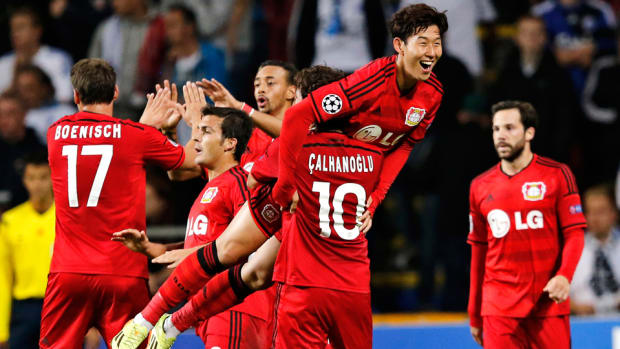Questions Still Linger Around U.S. Soccer Despite Reorganization of Technical Staff
U.S. Soccer reorganized its technical side on Monday, announcing that Earnie Stewart (as federation sporting director for men and women) and Kate Markgraf (as the women’s national team general manager) would take newly created roles in the organization. But in terms of news, the most prominent revelation was the one made by Markgraf—the owner of 201 caps, one World Cup title and two Olympic gold medals—who said all other things being equal, she would prefer to hire a woman as the next USWNT coach.
“I would like to hire a woman if all things are being equal, but in the end it will come down to the best candidate regardless of gender,” said Markgraf, who has been working in the media in recent years for ESPN.
While certainly not a definitive statement on who will replace Jill Ellis, Markgraf’s stance was encouraging news for anyone who wants to see the Utah Royals’ Laura Harvey—the most prominent female candidate for the job—named as the next WNT coach. On ESPN recently, Markgraf said her most likely candidates for the WNT job were Harvey, Paul Riley (North Carolina Courage), Vlatko Andonovski (Reign FC) and Mark Krikorian (Florida State).
U.S. Soccer president Carlos Cordeiro, who was on the teleconference with Markgraf and Stewart, didn’t express his preference Monday, but I’m told he pushed hard for a woman to run for federation vice-president earlier this year (Cindy Parlow Cone won uncontested) and wants to see more women in power at U.S. Soccer. Still, it isn’t clear yet how some of those women and former players—including Parlow Cone, Markgraf and other members of the Athlete Council that gave Cordeiro victory in the 2018 presidential election—view Cordeiro’s handling of the gender discrimination case brought by the current USWNT players.
Recently, Cordeiro and U.S. Soccer have drawn criticism from current USWNT players for claiming the federation has paid WNT players more than MNT players over the past 10 years—even the men’s players union disputed the federation’s numbers—and for paying Washington D.C. lobbyists to try and persuade lawmakers and Democratic presidential candidates to listen to the federation’s side.
These days, in the wake of the USWNT’s second straight World Cup title and the USMNT’s failure to qualify for World Cup 2018, it’s hard not to see so much that U.S. Soccer does through a gender lens. Did the announcements of Stewart and Markgraf really need to be made on the same day, relegating the WNT news to the second line of the news release?
What’s more, it was interesting to witness that here was U.S. Soccer promoting a male executive from the men’s side (Stewart) to a new position (sporting director) that oversees the entirety of the women’s technical side as well—including the woman (Markgraf) just hired to be the WNT GM.
It made me wonder: If the women’s GM had been hired a year before the men’s GM, instead of the other way around, would the women’s GM have been promoted to be in charge of the men’s technical side as well? Frankly, I doubt it. Not with this federation.
Stewart may well have been very good at his GM job—at least that’s what Cordeiro said on Monday—although the most public part of it, the process to hire Gregg Berhalter as MNT coach, could have gone a heck of a lot better. But now, as sporting director, Stewart will take on totally new responsibilities overseeing the MNT and WNT, to say nothing of the youth and extended national teams (beach, futsal and para 7-a-side) and high-performance and analytics departments.
Said Cordeiro: “Having Earnie overseeing our overall vision in my view will help create a world-class sports performance environment.” More than once on Monday, Cordeiro reiterated that he wanted “soccer operations run by soccer experts.” (Translation: I won’t be like my predecessor, Sunil Gulati, and hire coaches.)
As for Markgraf, her media experience with ESPN immediately made her the most facile communicator on Monday’s call among Stewart and Cordeiro, which is something that U.S Soccer needs. In terms of the GM job itself, it’s true that Markgraf has never been a GM before or coached at a high level. But her work on ESPN has shown her to be a talented soccer mind, and Cordeiro said she was the top candidate throughout the interview process. “Every decision we make is done by unanimous consent,” Cordeiro said.
Most people would agree that it’s smart to have Markgraf’s purview—and presumably that of the next men’s GM—include the youth national teams. It always seemed strange that Stewart’s original job description as men’s GM failed to include the youth national teams, but over the past year the federation appears to have figured out that the GM job needs to have more power. Cordeiro even said that Markgraf’s job duties will also include spearheading the bid to host the 2027 women’s World Cup and other tasks inside and outside CONCACAF.
The big question mark looming over all of this, of course, is who will be the next CEO, the most important day-to-day position in U.S. Soccer. (Current CEO Dan Flynn has already announced his imminent departure.) The concerns among some who work inside the federation that the new CEO will be Jay Berhalter, Flynn’s top deputy, have been so strong that they were aired publicly on Glassdoor and in the New York Times. U.S. Soccer responded by saying it would conduct a survey of its employees to determine if there is indeed a toxic work culture inside the federation.
From a conflict-of-interest perspective, there’s no way that Jay Berhalter should become the next CEO. As U.S. Soccer explained on Monday, the role of hiring and firing coaches will be down to the GMs and the sporting director. But the sporting director reports to the CEO. Can you imagine someday Stewart and the next MNT GM telling CEO Jay Berhalter they want to fire his brother, MNT coach Gregg Berhalter?
No, U.S. Soccer needs to go outside the federation to hire the next CEO, even though word has sifted out that few outside candidates are even interested in the CEO spot since the organization is currently involved in lawsuits with (among others) the current USWNT players, Hope Solo, a charity (the U.S. Soccer Foundation), Relevent Sports and the NASL.
The problem now is that if a new CEO comes in from outside U.S. Soccer, they might want to hire their own people who report to them on the technical side. And then we’ll wonder, rightly, why a new CEO wasn’t hired a year ago.
Despite all of this, there is an air of inevitability that Jay Berhalter will become the next CEO, and it feels a lot like the air of inevitability that Gregg Berhalter would become the MNT coach last year.
The federation needs some sweeping changes. It needs a CEO from the outside. And given the reputation that the federation continues to have about gender issues, all other things being equal, that CEO should be a woman.




